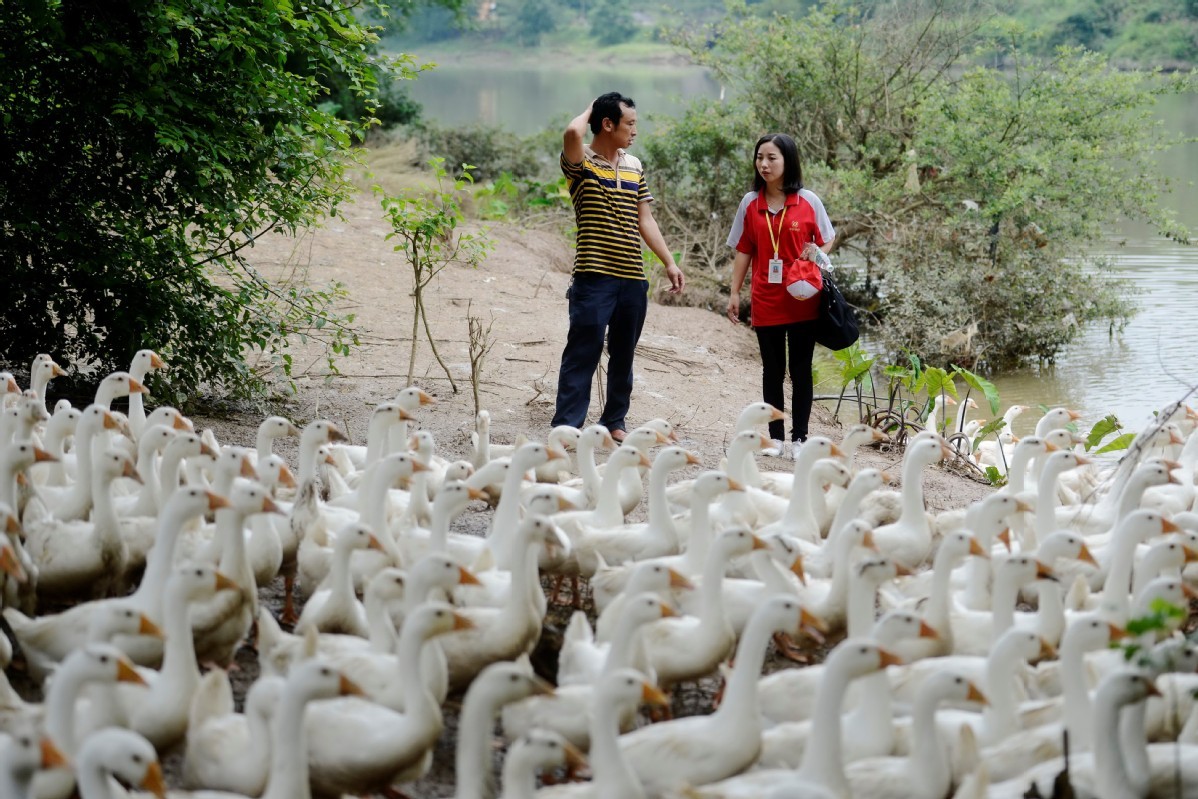
A CD Finance employee (right) addresses a farmer's queries in this file photo in Yueyang, Hunan province. [Photo/CHINA NEWS SERVICE]
Enhanced ties key to generating 'win-win' results for both sides
Microlending companies yearn for more cooperation with banks in jointly offering loans to small businesses and rural households or in assisting banks in microfinance, said Liu Dongwen, the CEO of CD Finance, a rural microfinance institution headquartered in Beijing.
"We look forward to further expanding our cooperation with banks. This will help us overcome our financing difficulties and relieve us from restrictions on leverage for microlending companies," Liu said. "Such cooperation will create win-win situations for banks, microfinance institutions and rural households."
As the organizational framework, corporate culture, products and risk control measures of commercial banks are not quite suitable for micro and small enterprises (MSEs) and agricultural-related business clients, demanding large banks to serve these clients is like "asking elephants to perform ballet", he said.
Based on international experience, it is more effective to provide funds to MSEs and small rural households by establishing microfinance institutions that specialize in serving them. Those institutions offer them special products and design procedures based specifically on their needs.
"Compared with banks, small nonbank financial service providers usually have better understanding of the risks associated with micro and small market entities and are more aware of their real needs," said Bei Duoguang, president of the Chinese Academy of Financial Inclusion at Renmin University of China.
"We hope that a sound ecosystem for financial inclusion will be created so that banks could support nonbank institutions, through which funds will flow to MSEs smoothly, just like blood flowing through the capillaries."
Financing is the biggest problem restricting the development of microlending companies, which are not allowed to absorb public deposits. They have to seek for funds through cooperation with financial institutions by obtaining wholesale loans from banks, issuing asset-backed securities, or assisting banks in microfinance.
By the end of April, the outstanding loan balance of CD Finance reached 11.09 billion yuan ($1.55 billion). Its balance of asset-backed securities was 4.36 billion yuan, accounting for 39.3 percent of the total. The balance of loans associated with the company's assistance to banks in microlending was 4.59 billion yuan, or 41.4 percent of the total.
"We hope that regulators and policymakers will give some policy space to high-quality microlending companies in terms of financing," Liu said. "We also hope that government agencies will have correct views on the role of microlending companies in the financial system."
China's top banking and insurance regulator issued a consultation draft of rules on commercial banks' online lending business on May 9.

Li Shiru, a farmer in Zhangjiakou, Hebei province, gets the loans from CD Finance to tie over difficulties in vegetable planting. [Photo/cdfinance.com]
It allowed banks to cooperate with financial and non-financial institutions, including microlending companies, in many areas such as customer acquisition, risk sharing, information technology and debt collection during the process of online lending.
"The regulator clearly defined how commercial banks will conduct online lending business and explicitly stated that microlending companies can help banks issue loans or work together with banks to provide funds to borrowers. Therefore, banks know what to expect and how to handle such business," Liu said.
"In the past, however, there were no unified rules to standardize the online lending business of commercial banks, so banks had to judge for themselves."
By seeking funds from banks and other financial institutions, microlending companies will not only ensure compliance but also reduce financing costs.
CD Finance has been striving to lower financing costs, operation costs and control loan losses through comprehensive risk management.
"We are the McDonald's of the rural finance sector," Liu said.
The company established two back offices in Beijing and Changsha, Hunan province, to support its 356 county-level branches across China in various aspects including technology, financing, branding, purchasing and human resources.
Targeting middle and low-income people in rural areas, its branches mainly offer loan products that require no collateral by assessing the creditworthiness of borrowers or their guarantors.
As the loan products and procedures are simplified and standardized, its locally recruited loan officers are capable of issuing loans after receiving short-term training.
With the help of Ant Financial Services Group which became its stakeholder in 2016, the company has built up a big data-based risk management team and adopted facial recognition, identity verification and bank card authentication technologies. This significantly improved its service capacity, reduced unnecessary costs and served to enhance the customer experience.
Its stakeholders include the International Finance Corporation and Sequoia Capital. TPG, a global alternative asset firm, also invested in the company through a social impact investing fund.
By the end of April, its loans which are at least 30 days past due accounted for 2.43 percent of its outstanding loan balance, up from 1.58 percent at the end of last year because of the novel coronavirus outbreak. The number of clients reached 402,874. The average loan balance per borrower was 27,566 yuan.


